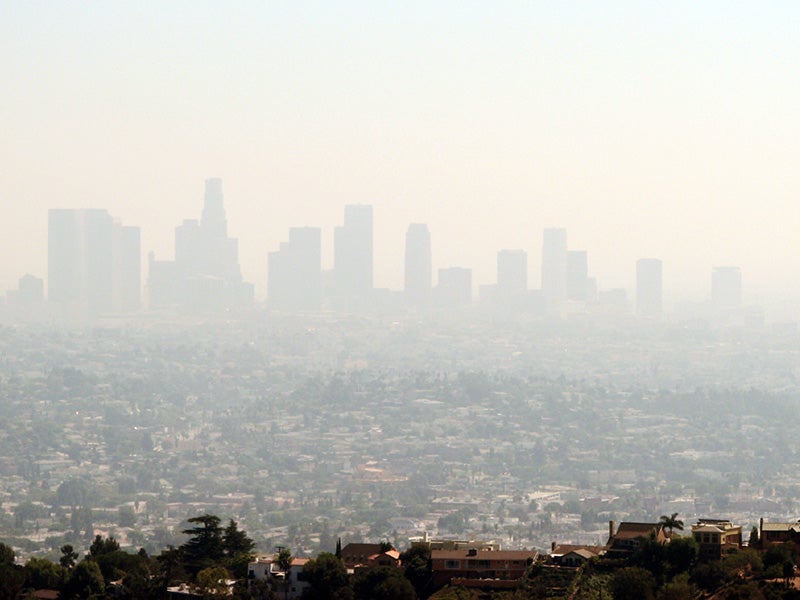Addressing Racial Disparities with Title VI
Communities of color in California's South Coast Air Basin are tired of holding their breath.
Communities of color in the South Coast Air Basin are tired of holding their breath. They are calling on the South Coast Air Quality Management District and the Environmental Protection Agency (EPA) to close loopholes in smog regulations and help save lives.
But the agency tasked with reducing emissions and improving air quality in these communities — the South Coast Air Quality Management District (“SCAQMD”) — has accepted polluting industry’s requests to weaken Clean Air Act protections in the region.
Ground level ozone, commonly called by its older name — “smog” makes it difficult for residents to breathe, can cause childhood asthma, and can eventually shorten your life. To limit ground level ozone, the federal Clean Air Act requires local agencies like SCAQMD to impose a penalty on major stationary sources to limit emissions that can form ozone: nitrous oxides and volatile organic compounds.
There are 400 major facilities in the South Coast Air Basin that release harmful gases that create ground level ozone. These major stationary sources facilities are overwhelmingly in communities of color, with nearly 75% of stationary source adjacent communities in the South Coast being made up of people of color.
For over a decade, SCAQMD has given major polluters a free pass on complying with the Clean Air Act. Some of the largest beneficiaries of this policy have been oil companies. Instead of making some of the richest corporations on the planet pay a fee for the region’s failure, the SCAQMD has used a toothless credit program that makes communities of color sick from the simple act of breathing.
To repair this broken system of limiting precursors to ozone, the People’s Collective for Environmental Justice, Communities for Better Environment, East Yard Communities for Environmental Justice, Sierra Club, and Earthjustice brought a complaint under Title VI of the Civil Rights Act of 1964.
Title VI of the Civil Rights Act of 1964 prohibits discrimination based on race, color, or national origin in programs or activities that receive federal financial assistance. A Title VI complaint alleges that a recipient of federal funds is creating policies that have a disparate impact on communities of color. EPA’s analysis focuses on the consequences of recipient’s policies rather than the recipient’s intent.
As a recipient of substantial federal financial assistance from EPA, SCAQMD and its discriminatory practices are subject to Title VI.
Instead of instituting a fee program that incentivizes large industrial polluters in the South Coast region to cut their emissions of nitrous oxides and volatile organic compounds, SCAQMD has succumbed to industry manipulations and created a program that allows them to take credit for a grab bag of programs untethered to limiting ozone pollution. This approach does nothing to alleviate the serious air quality concerns surrounding major stationary sources i.e., in communities of color forced to breathe noxious air. South Coast’s failure to institute a clear penalty is especially problematic when we consider the cumulative impacts on communities of color. Communities of color are especially sensitive to exposure from additional ozone pollution because of pre-existing health sensitivities. Furthermore, these communities are already overburdened by other types of pollution from transit corridors and port activity.
SCAQMD has found a way to avoid penalizing major stationary sources for their toxic emissions and take credits for programs that would have been implemented anyway. This veneer of a penalty harms communities of color. Simply, SCAQMD’s practices disproportionately impact communities of color and thus, violate Title VI.
In the interest of safeguarding public health for overburdened communities of color, frontline groups and environmental organizations call on EPA to exercise its authority to determine that the South Coast’s fee program has contributed to discriminatory pattern of perpetuating poor air quality in communities of color.
The California Regional Office fights for the rights of all to a healthy environment regardless of where in the state they live; we fight to protect the magnificent natural spaces and wildlife found in California; and we fight to transition California to a zero-emissions future where cars, trucks, buildings, and power plants run on clean energy, not fossil fuels.
Miranda Fox
Public Affairs and Communications Strategist, Earthjustice
mfox@earthjustice.org
